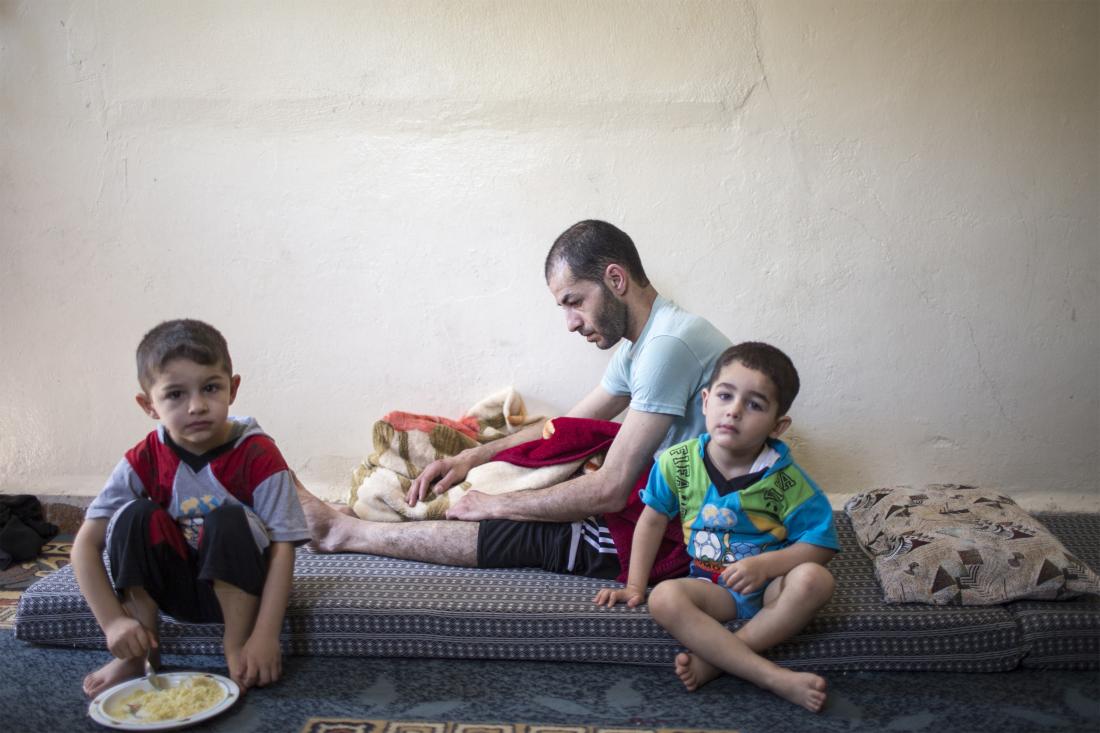Subsidized Housing to Change the Economic Outcomes and Social Integration of Syrian Refugees in Jordan
- Men and boys
- Refugees
- Families and households
- People experiencing housing instability
- Earnings and income
- Employment
- Post-conflict recovery
- Age of marriage
- Women’s/girls’ decision-making
- Gender attitudes and norms
- Attitudes and norms
- Health outcomes
- Mental health
- Social cohesion
- Housing and neighborhoods
- Migration
- Subsidies
Many countries have struggled to respond to the Syrian refugee crisis in a way that provides for refugees’ human needs and ensures cohesive integration into host communities. Though many policies and programs focus on immediate aid and short-term goals, individual refugee recovery and the stability of host communities is best observed on a longer time horizon. Researchers are conducting a randomized evaluation of a subsidized housing assistance program for refugees in Jordan to assess its impact on their economic outcomes, psychological well-being, long-term migration decisions, and social integration into their host community.
الموضوع الأساسي
Many host countries have struggled to respond to the Syrian refugee crisis in a way that provides for refugees’ human needs and ensures cohesive integration into host countries. An example of a type of program that attempts to address these needs is the provision of housing in local communities. Housing assistance programs support refugees in paying rent or renovating sub-standard housing as they settle into their new community and country. Though such programs are relatively common among the package of services provided to refugees, little is known about how they affect refugees’ economic outcomes and their integration into host communities. Rigorous evaluation could provide lessons on how policymakers can use housing assistance as both a means of humanitarian support and a development tool for local communities.
سياق التقييم
The Syrian conflict is in its eighth year and is seemingly unlikely to be resolved in the immediate future. Host countries react to the ebb and flow of refugee arrivals that results from changes in the intensity of the conflict with various policy measures. For example, a recent change in a Jordanian labor law allows Syrian refugees to apply for and receive work permits, responding to refugees’ need to build livelihoods. However, the concentration of refugees living in a community may impact social cohesion between the refugees and their neighbors.
As a primary partner with host country governments, the United Nations High Commissioner for Refugees (UNHCR) formally registers and collects data about most Syrian refugees who enter Jordan. Because social and economic benefits are often tied to registration, refugees are incentivized to maintain updated records of their contact information and housing arrangements as they move to permanent locations. However, less is known about the impact of housing assistance on their ability to integrate and their acceptance by their host communities once they find housing as well as economic and psychological outcomes or future migration patterns.
Around 80 percent of the refugee population surveyed in this study live in host communities. As individuals living in camps are not legally allowed to move into host communities, households eligible for the housing program must already live in a host community. The program currently operates in Irbid and Mafraq governorates, which together host 45 percent of the country’s Syrian refugees.

معلومات تفصيلية عن التدخل
Researchers are conducting a randomized evaluation of a subsidized housing assistance program for refugees in Jordan to assess its impact on their economic outcomes, psychological well-being, long-term migration decisions, and their social integration into host communities. Partnering with the NGO Norwegian Refugee Council-Jordan (NRC), researchers will evaluate its Urban Shelter program, which provides funds to renovate sub-standard housing and covers approximately twelve months of rent. Refugee households selected into the program receive approximately JOD 2,200 (US$3,102.96); a proportion of this money goes to the household’s landlord to renovate the home, while the remaining funds cover the refugee household’s rent for a year. The household is responsible for finding its own apartment, negotiating a two-year contract with the landlord, and deciding how to split the grant among renovation and rent reduction.
NRC consistently receives more applications than it has the budget to support, so it has partnered with researchers to randomly assign localities to either receive the program or form a comparison group until NRC reaches its capacity. Participation eligibility is determined by the NRC’s integrated assessment of a refugee household’s vulnerability. Those who score between the 90th percentile and 10th percentile on the assessment are randomly assigned to receive the program or not. However, those who score in the top and bottom 10 percent are excluded from the study. Specifically, those who score in the 90th percentile and above are considered the most vulnerable and, therefore, guaranteed assistance, while those below the 10th percentile do not receive the assistance because they often already have livable structures with minimal issues.
To measure the impact of the program and to learn more about refugees’ experiences, researchers have begun to administer the first-ever long-term survey of Syrian refugees, which collects detailed information on a range of economic outcomes, migration decisions, education levels, marriage age, health measures, and behavior and preferences. Researchers will follow up with households via frequent phone surveys throughout the program. To assess the economic impact of refugees on the host communities, researchers will conduct a series of market surveys on housing costs and commodity prices. They will also plan to survey Jordanian households to measure social cohesion of refugee households in their communities.
النتائج والدروس المستفادة بشأن السياسات
Study is ongoing; results are forthcoming.
